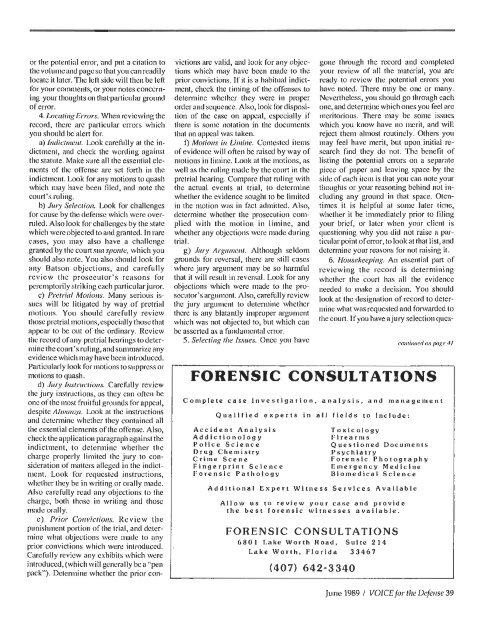CONTENTS v01. 18, NO. 10 FEATURE ARTICLES - Voice For The ...
CONTENTS v01. 18, NO. 10 FEATURE ARTICLES - Voice For The ...
CONTENTS v01. 18, NO. 10 FEATURE ARTICLES - Voice For The ...
You also want an ePaper? Increase the reach of your titles
YUMPU automatically turns print PDFs into web optimized ePapers that Google loves.
or the potential error, and put a citation tothevolunieand pageso that you can readilylocate it later. <strong>The</strong> left side will then be leftfor yourcomuients, or your notes concerningyour thoughts on thatparticular groundof error.4. Localirzg Errors. When reviewing therecord, there are particular errors whichyou should be alert for.a) Indict~i~eut. Look carefully at the indictment,and check the wording againstthe statute. Make sure all the essential elementsof the offense are set forth in theindictment. Look for any motions to quashwhich may have been filed, and note thecourt's ruling.b) Jltr)~ Selectioir. Look for challengesfor cause by the defense which were overruled.Also look for challenges by thestatewhich wereobjected toandgranted. Inrarecases, yon may also have a challengegranted by the courtsua sponte, which youshould also note. You also should look forany Batson objections, and carefullyreview the prosecutor's reasons forperemptorily strikingeachpiuticularjuror.c) Pretriul Motio~ts. Many serious issueswill be litigated by way of pretrialmotions. You should carefully reviewthose pretrial motions, especially those thatappear to be out of the ordinary. Reviewthe record of any pretrial hearings to determinethecourt'sruling, and summarize anyevidencewhichmay havebeenintroduced.Particularly look for motions tosuppressormotions to quash.d) Jlriy htstntct~ous. Carefully reviewthe jury instructions, as they can often beone of thenlost fruitful grounds forappeal,despite Ali~ruuza. Look at the instructionsand determine whether they contained alltheessential elements of the offense. Also,check theapplication paragraph against theindictment, to determine whether thecharge properly limited the jury to considerationof matters alleged in the indictment.Look for requested instructions,whether they be in writing or orally made.Also carefully read any objections to thecharge, both those in writing and thosemade orally.e) Prior Coueictio~ls. Review thepunishment portion of the trial, and determinewhat objections were made to anyprior convictions which were introduced.Carefully review any exhibits which wereintroduced, (which will generally be a "penpack"). Determine whether the prior con-victions am valid, and look for any objectionswhich may have been made to theprior convictions. If it is a habitual indictment,check the timing of the offenses todetermine whether they were in properorder and sequence. Also, look for dispositionof the case on appeal, especially ifthere is some notation in the documentsthat an appeal was taken.f) Motions in Lirnine. Contested itemsof evidence will often be raised by way ofmotions in limine. Look at the motions, aswell as the ruling made by the court in thepretrial hearing. Compare that mling withthe actual events at trial, to determinewhether the evidence sought to he limitedin the motion was in fact admitted. Also,determine whether the prosecution compliedwith the motion in limine, andwhether any objections were made duringtrial.g) Jury Argumerlt. Although seldomgrounds for reversal, there are still caseswhere jury argument may be so harmfulthat it will result in reversal. Look for anyobjections which were made to the prosecutor'sargument. Also, carefully reviewthe jury argument to determine whetherthere is any blatantly improper argumentwhich was not objected to, hut which canbe asserted as a fundamental ermr.5. Selecting the issues. Once you havegone through the record and completedyour review of all the material, you areready to review the potential errors youhave noted. <strong>The</strong>re may be one or many.Nevertheless, you should go through eachone, and determine whichones you feel aremeritorious. <strong>The</strong>re may be some issueswhich you know have no merit, and willreject them almost routinely. Others youmay feel have merit, hut upon initial resea~chfind they do not. <strong>The</strong> benefit oflisting the potential errors on a separatepiece of paper and leaving space by theside of each item is that you can note yourthoughts or your reasoning behind not includingany ground in that space. Otentimesit is helpful at some later time,whether it be immediately prior to filingyour brief, or later when your client isquestioning why you did not raise a particularpointoferror,tolookat thatlist,anddetermine your reasons for notraising it.6. Housekeeping. An essential part ofreviewing the record is determiningwhether the court has all the evidenceneeded to make a decision. You shouldlook at the designation of record to determinewhat was requested and forwarded tothecourt. Ifyon haveajury selectionques-FORENSIC CONSULTATIONSComplete case investigation, analysis, and managementQualified experts in all fields to include:Accident AnalysisAddictiooologyPolice ScienceDrug ChemistryCrime SceneFingerprint Science<strong>For</strong>ensic PathologyToxicologyFirearmsQuestioned DocumentsPsychiatry<strong>For</strong>ensic PhotographyEmergency MedicineBiomedical ScienceAdditional Expert Witness Services AvailableAllow us to review your case and providethe best forensic witnesses available.FORENSIC CONSULTATIONS6801 Lake Worth Road, Suite 214Lake Worth, Florida 33467June 1989 1 VOICE for the Defertse 39
















